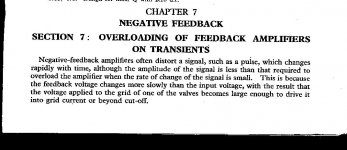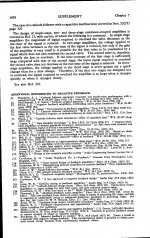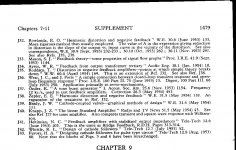SY, do you perhaps rememebr where you posted it? It would be a big help.
Sorry, no. I just hosted it and linked to it, but you should be able to find that post somewhere here on the forum. I think Bob's unpublished response was somewhere as well.
From an experimental point of view, take a modern general-purpose IC opamp (4562, 797, 2134...), configure it for a gain of (say) 20dB, and show us the SID or TIM. Despite the open loop bandwidth being well below 1kHz, you won't find any.
You seem to be more trusting than me. Most IEEE journal papers are attempting statements of fact, which makes them true or false. Opinion comes in the editorial pages of the IEEE magazines.dvv said:. . . regarding IEEE publications. While there is no official guarantee, practice shows it can be fully trusted nevertheless, as long as one is aware of the fact that it is a forum, and that there will be conflicting views and opinions.
The issue of open loop bandwidth is not resolved by having a 'battle of the gurus'. There are two aspects: matters of fact (e.g. the effect of OL bandwidth on distortion - deviation from the input signal), and matters of opinion (e.g. the audible effects of such distortion). These sometimes get mixed up, but matters of fact should be resolved without worrying about who said what when. The remaining matters of opinion may one day be turned into matters of fact when better measurements are available.
If a demonstrably true fact is stated then any dissenter is not 'expressing an opinion' but denying reality i.e. he is simply wrong. Of course, the demonstration of that fact has to be watertight, with all relevant assumptions stated.
The flaw in what stated persists.
Isn't that the common misdemeanor of legends ?
(dvv did do a proper prelude with the HK stories)
there does appear to be an alternate reality for believers
If you’re going to use “Expert Opinion” as evidence you really should know what the cited experts say - over time, after some consideration
Jung and Leach both later published that they came to disagree with Otala's prescription of "flat open loop gain" as being "the cure" for TIM
both explicitly stated that high open loop gain "high feedback" amps can be designed with low TIM
I have reread "the reply" paper several times over decades - it really has next to no new technical content - no new analysis - doesn't directly address, much less "destroy" Cordell's technical analysis
John Curl is on record as to Otala's "reasonableness" - admitting he was into “politicking" – claiming he even sabotaged John’s consulting opportunity
I recall “poison pen” attacks claiming “the reply” was withheld from publication to avoid embarrassing “powerful” JAES figures – a piece of McCarthy worthy spin
Thank you for the lead, John.
...Otala, Jung, Leach and Curl - sounds a bit like the audio world's version of the Earp brothers.High Noon At The Audio Saloon.
Where's James Bongiorno on that list to make it Once Only Ever In Your Town? Was he too busy making another one of his, as he calls them, audio pimp suits?
It's a funny thing, but people somehow seem very extreme over Otala's work. They either idolize it, or just plain hate it, no middle ground. He's either a genius, or a complete spin doctor.
I've always thought of him as a methodical, meticulous man, who saw a problem, sat down, thought it over and proposed some possible solutions to it, never (to the best of my knowledge) claiming that his were the only answers and/or solutions.
Perhaps because he seems to be so articulate, he puts it down like it was the natural thing to do, makes it all sound so easy. This always seems to irritate a lot of wooden scientists who never had a single original idea in their life and resent everyone who did.
If you’re going to use “Expert Opinion” as evidence you really should know what the cited experts say - over time, after some consideration
Jung and Leach both later published that they came to disagree with Otala's prescription of "flat open loop gain" as being "the cure" for TIM
both explicitly stated that high open loop gain "high feedback" amps can be designed with low TIM
I have reread "the reply" paper several times over decades - it really has next to no new technical content - no new analysis - doesn't directly address, much less "destroy" Cordell's technical analysis
John Curl is on record as to Otala's "reasonableness" - admitting he was into “politicking" – claiming he even sabotaged John’s consulting opportunity
I recall “poison pen” attacks claiming “the reply” was withheld from publication to avoid embarrassing “powerful” JAES figures – a piece of McCarthy worthy spin
Last edited:
It's a funny thing, but people somehow seem very extreme over Otala's work. They either idolize it, or just plain hate it, no middle ground. He's either a genius, or a complete spin doctor.
I don't see that at all, much criticism has been that he worked in his own hermetic audio world and did not recognize what had come before when it was pointed out. Large signal issues with op-amps was not new then and a complete search of the literature would have found references to slew rate and its problems.
I am not here to praise Otala, but to defend him.
Matti, like me, while acquiring some experience in amplifier design, LISTENED FOR HIMSELF, rather than going with the accepted trends of the day.
Many here like to claim that there was lots of info about slew rate limiting in the mid 1960's, on, but there was NOT! I know, because Cherry and Hooper wrote a book in the late '60's on amplifier design and there is NOTHING about slew rate limiting or anything nearly related to it in the entire 1000 page (approximately) book. I personally looked into what I had available back in 1970 or so, and it was very little, indeed. OF COURSE, we knew what slew rate was, all the IC op amps were limited by it, often fatally for anything but servos. But how to improve it, except for increasing gain-bandwidth of the design, itself, was not self-evident at the time.
Of course, an additional class by R.G. Meyer solved that dilemma, as did Solomon's excellent paper in the early 70's, then it was obvious.
Matti, like me, while acquiring some experience in amplifier design, LISTENED FOR HIMSELF, rather than going with the accepted trends of the day.
Many here like to claim that there was lots of info about slew rate limiting in the mid 1960's, on, but there was NOT! I know, because Cherry and Hooper wrote a book in the late '60's on amplifier design and there is NOTHING about slew rate limiting or anything nearly related to it in the entire 1000 page (approximately) book. I personally looked into what I had available back in 1970 or so, and it was very little, indeed. OF COURSE, we knew what slew rate was, all the IC op amps were limited by it, often fatally for anything but servos. But how to improve it, except for increasing gain-bandwidth of the design, itself, was not self-evident at the time.
Of course, an additional class by R.G. Meyer solved that dilemma, as did Solomon's excellent paper in the early 70's, then it was obvious.
I know, because Cherry and Hooper wrote a book in the late '60's on amplifier design and there is NOTHING about slew rate limiting or anything nearly related to it in the entire 1000 page (approximately) book.
Cherry and Hooper's blind spot is not really relevant here.
I think people often refer to this . Daugherty and Greiner 'Some Design Objectives for Audio Power Amplifiers' March 1966, IEEE Transactions on Audio and Electroacoustics '.
Where the mis-conception started, here's yet another level headed critique. This is actually very good and clearly written.
Slew Rate etc.
Last edited:
An older reference
Langford-Smith ed., Radiotron Designer's Handbook 4th ed. 1952, supplement as it appears in April 1965 printing.
Although little detail is provided, it's clear that people were both aware of and concerned about high rate-of-change signals overloading feedback amplifiers.
Langford-Smith ed., Radiotron Designer's Handbook 4th ed. 1952, supplement as it appears in April 1965 printing.
Although little detail is provided, it's clear that people were both aware of and concerned about high rate-of-change signals overloading feedback amplifiers.
Attachments
Sure it is, it was our linear design BIBLE at the time.
Although I treasure my copy, there is only so much room in a single book, regardless of how lengthy, particularly one that has a unified treatment of both tubes and transistors.
A quote from the chapter Large-Signal Amplifiers: "If careful choice of device and operating conditions and the use of local feedback do not reduce the static nonlinearity [note the implication that there is a dynamic nonlinearity
If memory serves, Otala never claimed to have discovered hot water, much less slew rate, he was concerned with transient phenomena and did say something to the effect of a larger slewing rate being an advantage.
What made him SO different from many others was that he identified the problem as he saw it and proceeded to solve it in a clear cut example of his amp. As some will remember, Per Oscarson of Norway obtained the rights to manufacture it, and thus Electrocompaniet was born.
In that example, Otala did insist on several points:
1. Pure class A operation down to -17 dB of nominal power (or was that 14 dB, not sure),
2. Open loop bandwidth as wide as possible, and he demonstarted 100 kHz with off-the-shelf inexpensive transistors, but 20 kHz as the very least, and
3. No more than about 20 dB global NFB.
Whether you believe that or not is your personal business. I tried it enough times in my life that I do believe he was right, perhaps not in each and every detail, but overall definitely.
No science anyone can throw at me can change the fact that I hear what I hear, and that is taht most amps made along those design lines tend to sound better than those using lots of global feedback. If my ears tell me one thing, and all the scince of this world says another, then the science is wrong, period.
Ultimately, science had proved that the world was flat, that Earth was the center of the universe and that politicians actually had a brain installed, even if disfunctional.
What made him SO different from many others was that he identified the problem as he saw it and proceeded to solve it in a clear cut example of his amp. As some will remember, Per Oscarson of Norway obtained the rights to manufacture it, and thus Electrocompaniet was born.
In that example, Otala did insist on several points:
1. Pure class A operation down to -17 dB of nominal power (or was that 14 dB, not sure),
2. Open loop bandwidth as wide as possible, and he demonstarted 100 kHz with off-the-shelf inexpensive transistors, but 20 kHz as the very least, and
3. No more than about 20 dB global NFB.
Whether you believe that or not is your personal business. I tried it enough times in my life that I do believe he was right, perhaps not in each and every detail, but overall definitely.
No science anyone can throw at me can change the fact that I hear what I hear, and that is taht most amps made along those design lines tend to sound better than those using lots of global feedback. If my ears tell me one thing, and all the scince of this world says another, then the science is wrong, period.
Ultimately, science had proved that the world was flat, that Earth was the center of the universe and that politicians actually had a brain installed, even if disfunctional.
I am not here to praise Otala, but to defend him.
Matti, like me, while acquiring some experience in amplifier design, LISTENED FOR HIMSELF, rather than going with the accepted trends of the day.
Many here like to claim that there was lots of info about slew rate limiting in the mid 1960's, on, but there was NOT! I know, because Cherry and Hooper wrote a book in the late '60's on amplifier design and there is NOTHING about slew rate limiting or anything nearly related to it in the entire 1000 page (approximately) book. I personally looked into what I had available back in 1970 or so, and it was very little, indeed. OF COURSE, we knew what slew rate was, all the IC op amps were limited by it, often fatally for anything but servos. But how to improve it, except for increasing gain-bandwidth of the design, itself, was not self-evident at the time.
Of course, an additional class by R.G. Meyer solved that dilemma, as did Solomon's excellent paper in the early 70's, then it was obvious.
John, we're both old enough to know that for every new notion, there will always be a slew of detractors. Remember that Columbus almost got burnt alive for believing that the Earth was round. Somehow, there are always many more naysayers than people with fresh new ideas.
Sometimes, I think our progress depends more not on new and fresh ideas, but on our capability to deal with mediocrity, as chains of mind are the hardest chains known to man. In every social system, there will always be those who had carved their own little comfy niche they stand to lose with further evolution, and they will defend them with their lives.
Far too manmy scientists today have no inkling of backing off with grace. There is no shame in not knowing something, the shame is not wanting to understand another man's point of view. Refusing to understand just because someone else thought of it first.
And that is a terminal illness, no cure.
Remember that Columbus almost got burnt alive for believing that the Earth was round.
I see that you and John took history from the same professor.
Remember that Columbus almost got burnt alive for believing that the Earth was round.
no. he didn't.
he had chinese maps from venice, i believe.
lots of folk knew what was 'over there'
no. he didn't.
he had chinese maps from venice, i believe.
lots of folk knew what was 'over there'
Interestingly, he DID have beliefs that clashed with contemporary wisdom. For example, he thought that Asia was much closer going Westward, that the Earth diameter was smaller than had been believed for about 2000 years, that there was no continent between Europe and Asia, and that Japan was very far east of China.
Of course he was wrong about all that, but it's not as good a story if you tell the truth.
I see that you and John took history from the same professor.
Very possibly, SY.
I'm 59 years old, and in my schooling, went through, in proper sequence, Yugoslav, Turkish, Pakistani, Yugoslav, British and Yugoslav educational systems. I have lived (lived = 1 year or longer), beside naturally my own country, then Yugoslavia, now Serbia, in Turkey, Britain and Egypt.
All that has taught me to be tolerant of other people's views, habits, cultures and customs. But also to stand up and be counted for my own.
I honestly believe Otala, and by extension John, are right. I do not expect other people to believe it, if they so choose, and will never think less of them because we don't agree. Wahab, for example, who is known by his choosing not to agree with Otala's theories, is no less respectable for me just because we disagree on this one point. Chances are we might agree on many other points, who knows. Inch'Allah, as the Arabs would say.
I disagreed with you, and most likely will again, but again, if we dig a little deeper than one or two theories, we would very likely find many a common point. I believe that is quite natural.
In the end, it comes down to why are we here. Are we here to learn more from the very differences of opinion, to show off our alleged knowledge, to get some help from alike souls, or whatever.
Your, or anybody else's disbelief in one of my beliefs merely serves to make me check and recheck my own beliefes, and if I find them valid nonetheless, to hone them further. Or, if your arguments seem valid to me, to modify and even change my beliefs. Or, if you should tell me, for example, that I shy away from FETs because I don't know how to work with them, all I can do is confirm my ignorance with them because that is the truth - but I am willing to learn, to change my views if I see reson for it.
It's all about how one perceives the differences between us. Unfortunately, mankind has always seen them as reasons for believeing in their own particular superiority and righteousness; I choose to see them as our common wealth, our joint pool of thought, as the difference neccessary for progress. If you didn't disagree with me, what would push me harder to move on, work harder?
- Status
- Not open for further replies.
- Home
- Member Areas
- The Lounge
- Sound Quality Vs. Measurements


